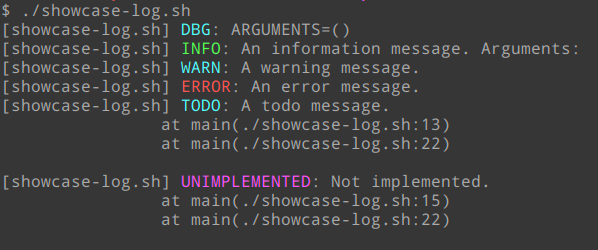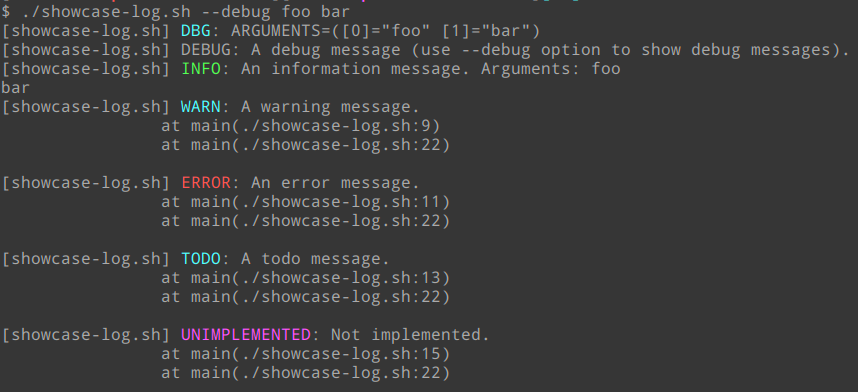
See documentation in HTML format.
Module loader and collection of modules for bash scripts, to quickly write safe bash scripts in unofficial bash strict mode.
Currently, bash-modules project is targetting users of Linux OS, such as system administrators.
bash-modules is developed at Fedora Linux and requires bash 4 or higher.
To include module(s) into your script (note the “.” at the beginning of the line):
. import.sh MODULE[...]To list available modules and show their documentation call import.sh as a command:
import.sh [OPTIONS]NOTE: Don’t be confused by import (without
.sh) command from ImageMagick package.
bash-modules uses import.sh, not
import.
#!/bin/bash
. import.sh log
info "Hello, world!"See more examples in bash-modules/examples directory.
bash-modules is licensed under terms of LGPL2+ license,
like glibc. You are not allowed to copy-paste the code of this project
into an your non-GPL-ed project, but you are free to use, modify, or
distribute bash-modules as a separate library.
My vision for the project is to create a loadable set of bash subroutines, which are:
Use install.sh script in bash-modules directory to
install bash-modules to ~/.local (default for a user) or
/usr/local/bin (default for a root user). See
./install.sh --help for options.
#!/bin/bash
. import.sh strict log arguments
main() {
debug "A debug message (use --debug option to show debug messages)."
info "An information message. Arguments: $*"
warn "A warning message."
error "An error message."
todo "A todo message."
unimplemented "Not implemented."
}
arguments::parse -- "$@" || panic "Cannot parse arguments."
dbg ARGUMENTS
main "${ARGUMENTS[@]}"

#!/bin/bash
. import.sh strict log arguments
NAME="John"
AGE=42
MARRIED="no"
main() {
info "Name: $NAME"
info "Age: $AGE"
info "Married: $MARRIED"
info "Other arguments: $*"
}
arguments::parse \
"-n|--name)NAME;String,Required" \
"-a|--age)AGE;Number,(( AGE >= 18 ))" \
"-m|--married)MARRIED;Boolean" \
-- "$@" || panic "Cannot parse arguments. Use \"--help\" to show options."
main "${ARGUMENTS[@]}" || exit $?
# Comments marked by "#>>" are shown by --help.
# Comments marked by "#>" and "#>>" are shown by --man.
#> Example of a script with parsing of arguments.
#>>
#>> Usage: showcase-arguments.sh [OPTIONS] [--] [ARGUMENTS]
#>>
#>> OPTIONS:
#>>
#>> -h|--help show this help screen.
#>> --man show complete manual.
#>> -n|--name NAME set name. Name must not be empty. Default name is "John".
#>> -a|--age AGE set age. Age must be >= 18. Default age is 42.
#>> -m|--married set married flag to "yes". Default value is "no".
#>>


#!/bin/bash
. import.sh strict log
a() {
b
}
b() {
c
}
c() {
d
}
d() {
false
}
a
bash-modules log module supports two
strategies to handle errors:
The first, strategy is to report the error to user, and then return error code from the function, to produce chain of errors. This technique allows for system administrator to understand faster - why script failed and what it tried to achieve.
#!/bin/bash
. import.sh strict log
foo() {
xxx || { error "Cannot execute xxx."; return 1; }
}
bar() {
foo || { error "Cannot perform foo."; return 1; }
}
main() {
bar || { error "Cannot perform bar."; return 1; }
}
main "$@" || exit $?$ ./chain-of-errors.sh
./chain-of-errors.sh: line 4: xxx: command not found
[chain-of-errors.sh] ERROR: Cannot execute xxx.
[chain-of-errors.sh] ERROR: Cannot perform foo.
[chain-of-errors.sh] ERROR: Cannot perform bar.The second strategy is just to panic, when error happened, and abort script. Stacktrace is printed automatically in this case.
#!/bin/bash
. import.sh strict log
xxx || panic "Cannot execute xxx."$ ./simple-panic.sh
./simple-panic.sh: line 3: xxx: command not found
[simple-panic.sh] PANIC: Cannot execute xxx.
at main(./simple-panic.sh:3)NOTE: If error happened in a subshell, then script author need to add
another panic handler after end of subshell,
e.g. ( false || panic "foo" ) || panic "bar".